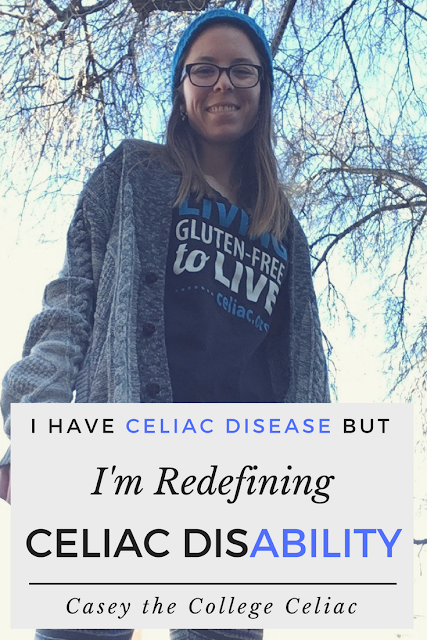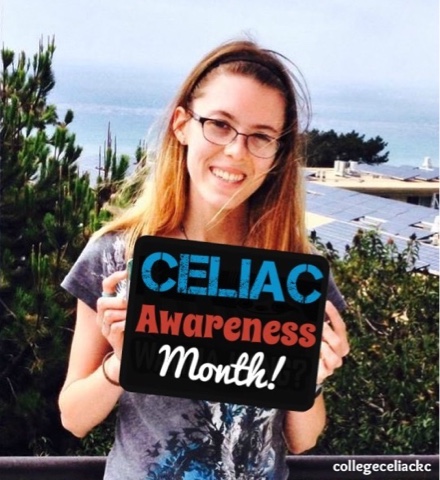Redefining Celiac Disability
Last semester, I received an email from my school's Disability Resource Center. Would I like to join the DRC's Honor Society? If so, just reply. Nearly as quickly as it took for the email to load, though, I deleted it.
Though I'm still not entirely sure of the answer, I have a guess: as I explained to a friend, sometimes I feel like a "fraud" when disability and my name connect. Compared to some students in the DRC, I don't have a physical illness that requires a walker or wheelchair. I don't have a learning disability - in fact, even though I was hospitalized for celiac complications during my freshman year, I've fought for and maintained a 4.0 GPA throughout college.
So why did I say no? Perhaps, as I've started to realize, because "disabled" is a loaded, victimizing word I'm wary of placing on my shoulders. By its very etymology, "disabled" is formed by combining "dis" (a Latin prefix meaning "apart," "asunder," "away," or having a negative, reversing effect) and "ability" (having the means or skill to do something).
Yet, when my view changes when I picture the "disabled" people who have blessed my life. Elizabeth with cerebral palsy; Meghan with fibromyalgia and Ehlers-Danlos; Sarah with a heart defect; blogger friends with celiac and food allergies; even my mom, a fibro warrior. Their disabilities don't make them any less badass - so why would it make me?
I learn more about my community, my disease and, especially, myself. And if that isn't a sign that I'm as "able" as ever - disease or disability included - I don't know what is.
Why didn't I want to join? Why did it take so little time for me to decide? Those questions have lingered my mind much longer than the original email.
Though I'm still not entirely sure of the answer, I have a guess: as I explained to a friend, sometimes I feel like a "fraud" when disability and my name connect. Compared to some students in the DRC, I don't have a physical illness that requires a walker or wheelchair. I don't have a learning disability - in fact, even though I was hospitalized for celiac complications during my freshman year, I've fought for and maintained a 4.0 GPA throughout college.
When you look at me, hear me speak or watch me in class, I don't fit the typical "disabled" stereotype. So, I found myself wondering, do I really deserve extra recognition for my academic accomplishments?
My roommate laughed at my doubts, saying, "Girl, you have celiac and fibromyalgia. You have more issues than most DRC students!"
All of which is true. Not to mention I understand - and appreciate - the ability to require celiac food accommodations in schools under the 504 Plan. I know that, as of 2013, the Americans With Disabilities Act includes celiac disease. And, if I get glutened, my body and my mind give out on me - and I feel anything but "able."
 |
| Putting my linguistics class to work! |
So why did I say no? Perhaps, as I've started to realize, because "disabled" is a loaded, victimizing word I'm wary of placing on my shoulders. By its very etymology, "disabled" is formed by combining "dis" (a Latin prefix meaning "apart," "asunder," "away," or having a negative, reversing effect) and "ability" (having the means or skill to do something).
As someone who does face several medical challenges - from fibromyalgia fatigue and pain to my need for a strict gluten free diet), I need to believe I can succeed at anything if I work for it. (Besides eating gluten without ill effects of course!). I need to see myself as able so my beliefs will become a reality. Embracing a "disabled" status seems to contradict this goal.
Yet, the more I think, the more I believe the problem isn't with the term "disability" per se. Instead, it's my view of being disabled. If I view disabilities from a societal perspective - which often sees disabled people as completely incapable or, at the very least, "imperfect" compared to the social ideal - I definitely wouldn't want to rock that title.
Yet, when my view changes when I picture the "disabled" people who have blessed my life. Elizabeth with cerebral palsy; Meghan with fibromyalgia and Ehlers-Danlos; Sarah with a heart defect; blogger friends with celiac and food allergies; even my mom, a fibro warrior. Their disabilities don't make them any less badass - so why would it make me?
Although I didn't end up joining my school's Honor Society at the DRC, I like to think that I earned my own "honors" by exploring the motivations behind my decision. In fact, one of my favorite parts of Celiac Awareness Month (this May in case you've been hiding under a Twitter-free rock!) is that I learn just as much as those who have never heard of celiac disease.
I learn more about my community, my disease and, especially, myself. And if that isn't a sign that I'm as "able" as ever - disease or disability included - I don't know what is.
Do you view celiac as a disability? How do you balance feeling empowered but also aware of your medical issues? Comment below!





Celiac is a chronic condition that requires strict adherence to a gluten free diet to avoid being disabled. We know it's not a binary distinction: disabled vs. not disabled. But for things like the ADA, we probably need to accept this deficiency in the langage. Maybe we're "conditionally disabled".
ReplyDeleteI love your term, "conditionally disabled." I think that's a perfect way to phrase it Dick! And I agree. Language may never "fit" our celiac situation perfectly, but our behavior can!
Delete